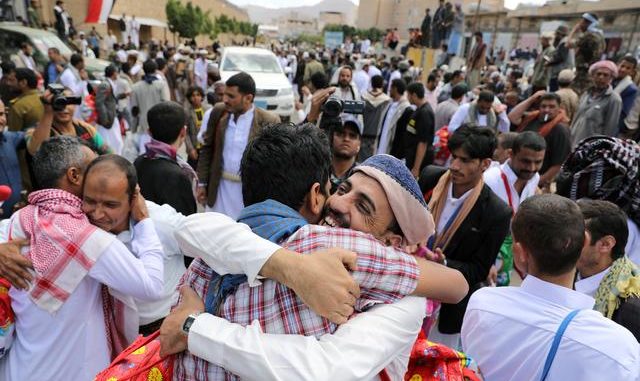
The Houthi group in control of Yemen’s capital released hundreds of prisoners on Monday in a unilateral move, which the United Nations hoped would help revive a stalled peace process after months of failed efforts to push through a prisoner swap.
Dozens of men in clean, new, white clothing walked out of the central prison in the capital Sanaa and lined up outside, supervised by men in military uniforms.
“Our initiative proves our credibility in implementing the Sweden agreement and we call on the other party to take a comparable step,” the head of the Houthis’ prisoner affairs committee, Abdul Qader al-Murtada, told reporters assembled for the release.
The International Committee of the Red Cross (ICRC), which facilitated the release, said 290 Yemeni nationals were transferred from the Houthi-controlled capital Sanaa to their homes.
The Iran-aligned Houthis agreed in Sweden in December with Yemen’s Saudi-backed government to swap prisoners as a confidence-building step. But the arrangement has been stalled as the sides struggled to agree on implementation. Each side was meant to release around 7,000 prisoners.
The Houthis said on Monday they were releasing “350 prisoners and detainees” drawn from the list prepared for the deal, including three Saudis.
The U.N. Yemen envoy, Martin Griffiths, called on all parties to meet soon to discuss prisoner exchanges.
“I hope this step will lead to further initiatives that will facilitate the exchange of all the conflict-related detainees as per the Stockholm Agreement,” he said.Detainees hug relatives after their release by the Houthis outside the central prison of Sanaa, Yemen September 30, 2019. REUTERS/Khaled Abdullah
The conflict has killed tens of thousands of people and pushed millions to the brink of famine. The United Nations calls it the world’s worst humanitarian crisis.
Fabrizio Carboni, ICRC Director for Near and Middle East, said in a statement: “The humanitarian situation in Yemen is catastrophic and any momentum towards easing the hardship is a positive development.”
A Saudi-led Sunni Muslim coalition which receives arms and intelligence from Western countries intervened in Yemen in March 2015 after the Houthis ousted the Yemeni government from Sanaa.
Coalition spokesman Colonel Turki al-Malki, asked at a news conference on Monday about the prisoner release, said he did not have information on it.
ATTACK CLAIMS
Ongoing violence across Yemen and growing regional tensions have complicated U.N.-led peace efforts.
The anti-Houthi coalition itself has come under strain, with southern separatists backed by Saudi Arabia’s ally the United Arab Emirates turning against the Saudi-backed government.
The Houthis, who control most major urban areas in Yemen, have carried out ground attacks against coalition forces and launched missiles and drones into Saudi Arabia. The coalition carries out air strikes against Houthi targets in Yemen.
The Houthis claimed responsibility for a Sept. 14 attack on a major Saudi crude oil processing plant that cut off around 5% of global oil supplies. Saudi Arabia says Iran, not the Houthis, was to blame.
The Houthis said on Sept. 20 they would halt missile and drone attacks on Saudi Arabia if the alliance stopped its operations. The coalition has not yet responded.Slideshow (13 Images)
On Saturday the Houthis said they had carried out a major attack, in which thousands of troops and many vehicles were captured, near the border with Saudi Arabia’s southern region of Najran.
Yemen’s interior minister denied that the incident had taken place and said video released by the Houthis was old footage.
Reporting by Lisa Barrington and Reuters team in Yemen,; Additional reporting by Maher Chmaytelli, Stephen Kalin in Riyadh and Stephanie Nebehay in Geneva; Editing by Peter Graff, Andrew Heavens, Timothy Heritage and Alex Richardson
SANAA (Reuters) –
